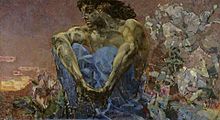- Demon (poem)
-
 Lermontov's Demon as interpreted by Mikhail Vrubel, 1890
Lermontov's Demon as interpreted by Mikhail Vrubel, 1890
Demon (Russian: Демон) is a poem by Mikhail Lermontov, written in several versions in the years 1829 to 1839. It is considered a masterpiece of European Romantic poetry.
Lermontov began work on the poem when he was just 14[1] or 15,[2] but completed it only during his Caucasus exile.[3] Lermontov wrote six major variations of the poem, and the final version was not published until 1842, after his death.[2]
The poem is set in Lermontov's beloved Caucasus Mountains. It opens with the eponymous protagonist wandering the earth, hopeless and troubled. He dwells in infinite isolation, his immortality and unlimited power a worthless burden. Then he espies the beautiful Princess Tamara, dancing for her wedding, and in the desert of his soul wells an indescribable emotion.
The Demon, acting as a brutal and powerful tyrant, destroys his rival: at his instigation, robbers come to despoil the wedding and kill Tamara's betrothed. The Demon courts Tamara, and Tamara knows fear, yet in him she sees not a demon nor an angel but a tortured soul. Eventually she yields to his embrace, but his kiss is fatal. And though she is taken to Heaven, the Demon is left again "Alone in all the universe, Abandoned, without love or hope!...".[1][4]
Contents
Gallery
-
Tamara and the Demon - Konstantin Makovsky, 1889
-
Tamara and the Demon - Mikhail Vrubel, 1890
See also
- The Demon (opera), an opera based on the poem
External links
- Full text of Demon (Russian)
- Full English translation of Demon by Alexander Condie Stephen (1875) (English)
- Pulhritudova, E (1964). ""Демон" как философская поэма ["Demon" as a philosophical poem]" (in Russian). Творчество М. Ю. Лермонтова: 150 лет со дня рождения, 1814—1964 [The Works of Lermontov: 150 years from his date of birth, 1814-1964]. Moscow: Nauka. pp. 76–105. http://lermontov.niv.ru/lermontov/kritika/pulhritudova-demon.htm. Retrieved March 2011. (Russian)
- Analysis of Demon at Russian Cinema (Russian)
- Analysis of Demon at Litra.ru (Russian)
- Comparative analysis of Demon and Mtsyri at Erudition.ru (Russian)
Further reading
- Reid, Robert (1982). "Lermontov's Demon: A Question of Identity". Slavonic and East European Review (School of Slavonic and East European Studies, University College London) (60): 189–210. (English)
References
- ^ a b "Mikhail (Yuryevich) Lermontov". Pegasus. http://www.kirjasto.sci.fi/mihaille.htm. Retrieved March 1, 2011. (English)
- ^ a b Nina Khachiyan (December 2006). "Vrubel's Demons". Nina Khachiyan's website. http://www.ninakhachiyan.com/writtenwords5.php. Retrieved March 1, 2011. (English)
- ^ "Michael Lermontov (1814 - 1841)". Friends & Partners. 1996, 2005. http://www.friends-partners.org/friends/literature/19century/lermontov.html%28opt,mozilla,unix,english,,new%29. Retrieved March 1, 2011. (English)
- ^ Novikov, V, ed (1996). "Demon" (in Russian). Все шедевры мировой литературы в кратком изложении. Сюжеты и характеры. Русская литература XIX века [All the masterpieces of world literature in summary form. Plots and characters. Russian literature of the XIX century]. Moscow: Olympus. http://briefly.ru/lermontov/vostochnaja_povest/. Retrieved March 2011. (Russian)
Works by Mikhail Lermontov Poems Spring (1830) · Borodino (1837) · Death of the Poet (1837) · The Song of the Merchant Kalashnikov (1837) · Sashka (1839) · The Novice (1840) · The Demon (1841) · The Princess of the Tide (1841) · Valerik (1841)

Plays A Strange Man (1831) · The Masquerade (1835)
Fiction A Hero of Our Time (1840)
Categories:- Poetry by Mikhail Lermontov
- 1842 poems
-
Wikimedia Foundation. 2010.


